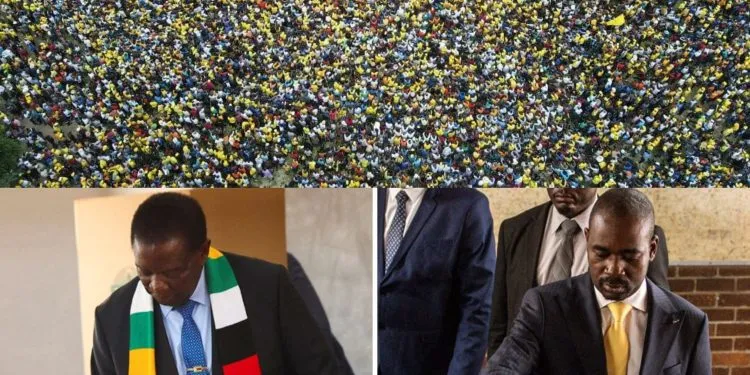Zimbabweans, eager for a transformative shift amidst the prevailing economic turmoil, patiently endured long hours of waiting on Wednesday to cast their votes. However, experts expressed doubt regarding the ruling ZANU-PF party’s willingness to conduct a fair election or relinquish its firm grip on authority.
Following a turbulent first term that saw extreme inflation, severe currency shortages, and skyrocketing unemployment rates, President Emmerson Mnangagwa is running for reelection. These dire circumstances have forced countless Zimbabweans to heavily rely on financial assistance from their overseas relatives in order to meet their basic needs.
80-year-old Emmerson Mnangagwa assumed power following the ousting of long-standing ruler Robert Mugabe in a military coup back in 2017. In a highly anticipated political showdown, the stage is set for a fierce battle as the incumbent leader finds himself up against a formidable lineup of 10 other candidates. Amongst them stands his primary adversary, the lawyer and pastor, Nelson Chamisa, aged 45, who represents the Citizens Coalition for Change.
Chamisa had a massive rally on Monday, which has given many the belief that he has what it takes to create a shift in Zimbabwe’s political landscape.
More than 10,000 people, many clad in bright yellow, gathered on Monday for a climactic show of support for Zimbabwean opposition leader Nelson Chamisa ahead of today’s tense general elections. The southern African country took to the polls today, Wednesday for presidential and legislative elections, with Chamisa, vying to defeat hardline Mnangagwa. The vote, taking place against a backdrop of discontent over Zimbabwe’s economic crisis, is being closely watched as a barometer of popularity for the ZANU-PF party, which has been in power since independence 43 years ago.
Main opposition party comes together
Supporters of Chamisa’s Citizens Coalition for Change (CCC) gathered on a parched plot of land in central Harare, from where the ZANU-PF’s towering headquarters are visible.
“Zimbabwe, our time has come. This is the time!” Chamisa told the crowd from a podium.
“We are going to win with a big and wide margin. Let’s just prepare for our inauguration.”
The rally marked the end of a bloody campaign that saw dozens of Chamisa’s campaign meetings banned and some of his supporters assaulted by alleged ZANU activists.
Despite over 100 meetings being blocked, said Chamisa, who is also a Pentecostal preacher, “God has said this is my time to be president.”
CCC supporters chanted in Shona, “ZANU-PF rule will end, vote for Chamisa, poverty will end, Chamisa will get into office and end corruption; bring suffering to an end.”
CCC pushes for change
The CCC is popular in Harare and other cities, particularly among young people, who account for the lion’s share of the electorate, whereas ZANU-PF is stronger in rural areas.
“We have been under the same government for 43 years, and there is no change,” said David, a 25-year-old sociology graduate from Harare. He preferred to give only his first name in a country where the opposition regularly complained about intimidation.
“It’s the right time for change, and Chamisa is the right guy to deliver what we want as young people,” David told AFP at the rally.
“There is no hope and no light in Zimbabwe as long as we have this ZANU-PF leadership,” said another supporter, a 35-year-old unemployed man who gave his name in Tendai. He was fully dressed in yellow and clutched a plastic yellow trumpet.
History of Zimbabwe
The former British colony, then named Rhodesia, broke away from London in 1965 under white-minority rule. After a long guerrilla war, it gained independence in 1980 and was renamed Zimbabwe. However, the fledgling democracy spiraled into authoritarianism and economic decline under its first president, Robert Mugabe, whom the miltiary forced out in 2017.
Modern-day issues
Almost two-thirds of Zimbabweans are under 25, according to UN figures. But despite their country’s mineral riches and agricultural wealth, many of them struggle to find stable jobs. The economy is mired in hyperinflation and what the World Bank describes as “unsustainable” debt levels.
Inflation reached 175.8 percent in June, and slowed to 101 percent in July, according to official figures, although some economists estimate it to be much higher. Basic foodstuffs are unaffordable for some, and there are shortages of medicines in public hospitals—a problem widely blamed on mismanagement and graft.



